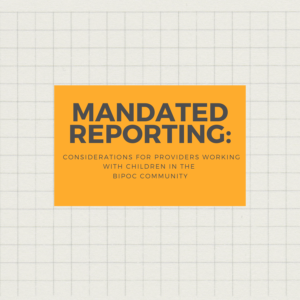 Since Black and Native American children are disproportionately reported and involved in child protective services in Minnesota, reading literature on topics such as systemic racism, ways to help break cycles and help children thrive, family preservation, kinship care, and building on the strengths of families is the first of many systems towards systemic change for everyone who works with children, but especially important when working with the BIPOC community.
Since Black and Native American children are disproportionately reported and involved in child protective services in Minnesota, reading literature on topics such as systemic racism, ways to help break cycles and help children thrive, family preservation, kinship care, and building on the strengths of families is the first of many systems towards systemic change for everyone who works with children, but especially important when working with the BIPOC community.
If you work in education, legal or law enforcement, the medical field, or social services—keep reading.
According to childwelfare.gov, the most common professional report sources for child maltreatment include the following:
Educational personnel (20.0%)
Legal and law enforcement personnel (19.1%)
Medical Personnel (11.0%)
Social Services Staff (10.3%)
As mandated reporters of child abuse and neglect, I was initially somewhat surprised to see that mental health therapists would be considered at the very end of this list. But the more I thought about it, it does make sense. The therapeutic relationship is an important foundation of our work as therapists. Therapists are trained to ask open-ended questions and listen to understand. We do a lot of work on ourselves—to examine any biases or assumptions both conscious and unconscious which is important work as self-as-therapist. We have opportunities to consult with a supervisor if needed before making a mandated report. We are required to complete training around the topic of mandated reporting in addition to many other continuing education topics.
Asking questions and having a relationship with the individual or family can be helpful before jumping to conclusions with an unnecessary report. For example, if a child’s clothing appears “dirty” this could be related to factors unrelated to neglect such as limited resources for clothing or lack of access to resources for washing clothing. Families may need resources and providing options for such resources are listed here can help: https://www.health.state.mn.us/people/childrenyouth/cyshn/family.html Of course, there is a legal responsibility of reporting the maltreatment of minors in which child abuse or neglect is suspected.
Depending on your position, level of support, access, and opportunities for training, you may be seeking some additional resources to assist your work with families.
Here are some resources from the Child Welfare Information Gateway for additional reading:
African American Grandfamilies: Helping Children Thrive Through Connection to Family and Culture Generations United (2020) https://www.gu.org/resources/african-american-grandfamilies-helping-children-thrive-through-connection-to-family-and-culture/
A Connectedness Framework: Breaking the Cycle of Child Removal for Black and Indigenous Children Chase & Ulrich (2022) International Journal on Child Maltreatment: Research, Policy and Practice, 5 https://link.springer.com/article/10.1007/s42448-021-00105-6
Family, Economic, and Geographic Characteristics of Black Families With Children Lloyd, Alvira-Hammond, Carlson, & Logan (2021) Child Trends https://www.childtrends.org/publications/family-economic-and-geographic-characteristics-of-black-families-with-children
Family Preservation Matters: Why Kinship Care for Black Families, Native American Families, and Other Families of Color Is Critical to Preserve Culture and Restore Family Bonds Hopkins (2020) Juvenile Law Center https://jlc.org/news/family-preservation-matters-why-kinship-care-black-families-native-american-families-and-other
Fighting Institutional Racism at the Front End of Child Welfare Systems: A Call to Action to End the Unjust, Unnecessary, and Disproportionate Removal of Black Children From Their Families Children’s Rights (2021) https://www.childrensrights.org/wp-content/uploads/2021/05/Childrens-Rights-2021-Call-to-Action-Report.pdf
Reimagining Black Families’ Cultural Assets Can Inform Policies and Practices That Enhance Their Well-Being Lloyd, Shaw, Sanders, Abdul-Masih, & Schaefer (2022) Child Trends https://www.childtrends.org/publications/reimagining-black-families-cultural-assets-can-inform-policies-and-practices-that-enhance-their-well-being
Why Develop a Culturally Sensitive Approach to Social Work with African American Clients? Hawkins: The New Social Worker https://www.socialworker.com/feature-articles/practice/why-develop-a-culturally-sensitive-approach
Written By: Charlotte Johnson, MA, LPCC
We’re Here to help
Our wellness experts will be happy to take care of you. You can CLICK HERE to schedule an appointment now or call (612)223-8898.
Meet Clinicians
We’re united by our commitment to providing effective, relevant, and innovative mental health support at all stages of your journey. Click Here to find a therapist or find out more about who we are, where we come from, and how we live out CARE’s mission every day.
The professionals at CARE are actively collecting and creating resources to help with what you need and address frequently asked questions. We’re Here for You.


